

Multipurpose Monday: A Motley of iPad Bingo Cards. I stumbled upon an iPad Bingo Card a few weeks ago in a discussion thread.
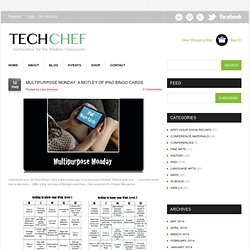
KS3 - Can You Compute? Switched on Computing community. Computer Science Unplugged. Resourcing primary computing. Most folk involved in English schools will already be well aware that there are some significant changes planned for the national curriculum this September.
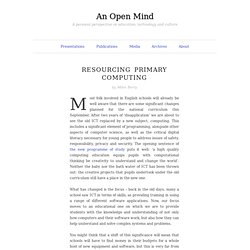
After two years of ‘disapplication’ we are about to see the old ICT replaced by a new subject, computing. This includes a significant element of programming, alongside other aspects of computer science, as well as the critical digital literacy necessary for young people to address issues of safety, responsibility, privacy and security. The opening sentence of the new programme of study puts it well: ‘a high quality computing education equips pupils with computational thinking be creativity to understand and change the world’. Neither the baby nor the bath water of ICT has been thrown out: the creative projects that pupils undertook under the old curriculum still have a place in the new one. Why I don’t want everyone to learn how to code. …if you can imagine a computer doing something, you can program a computer to do that.
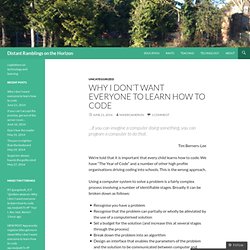
Tim Berners-Lee. Hour of Code: five steps to learn how to code. Next week sees the Hour of Code concept arrive in British schools.
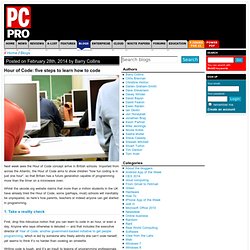
Imported from across the Atlantic, the Hour of Code aims to show children “how fun coding is in just one hour”, so that Britain has a future generation capable of programming more than the timer on a microwave oven. Whilst the ukcode.org website claims that more than a million students in the UK have already tried the Hour of Code, some (perhaps, most) schools will inevitably be unprepared, so here’s how parents, teachers or indeed anyone can get started in programming. 1.
15+ Ways of Teaching Every Student to Code (Even Without a Computer) According to Code.org, 90 percent of parents in the U.S. want their children to learn computer science—it will be crucial for many jobs in the near future—but only 40 percent of schools teach it. Critics claim that it is mainly the more affluent schools that offer computer science courses, thus denying those who attend poorer schools the chance to learn necessary skills.
Ntrol, programming, gaming - Ipads in primary. Early skills Some apps to encourage early computing skills.
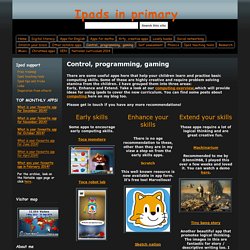
Toca monsters Toca robot lab There is a wide range of Toca apps that support children to learn basic control skills. They are great fun and my children love them! Build and play 3D. Tablets in schools: coding, creativity and the importance of teachers. From September, coding will be part of the primary and secondary education curriculum in the UK, as part of wider changes designed to boost computer literacy alongside reading, writing and maths skills for British children.
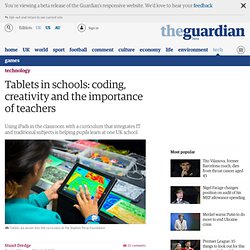
Some independent schools are already providing a glimpse at the potential. Which is why I recently found myself in Cambridge, watching a classroom of Year 5 girls – 9-10 year-olds – practising their programming skills on iPad apps like Hopscotch, Move the Turtle and Kodable. The school is the Stephen Perse Foundation, where I later see a Year 7 class sat at computers getting hands on with MIT's Scratch programming language, then meet members of the school's App Club, who have been making their own apps using Objective-C.
The Foundation even has its own director of digital strategy, Dan Edwards, who is one of more than 2,000 Apple Distinguished Educators dotted around the world. Adam Foster's Blog. PBS Kids makes Geometry and Problem Solving FUN with Augmented Reality. 11 apps for coding: From beginners to masters. By Meris Stansbury, Associate Editor @eSN_Meris Read more by Meris Stansbury January 17th, 2014 Coding, the hottest skill coming down the education pipeline, is also a mobile app star As students begin to not only use technology, but create it’s functionality, a recent explosion in coding resources have hit the web, providing coding apps ranging from introductions for beginners and middle-schoolers to more technical resources aimed at the tech-savvy.

Education Apps – Eleven Apps for Coding on Tablets. Updated 15/01/2015 - Apps for Coding on Tablets With an increasing focus on programming and coding finding the way onto the curriculum in many different countries across the globe, developers are creating materials which can help educators skill themselves, and also to support pupils in this area.
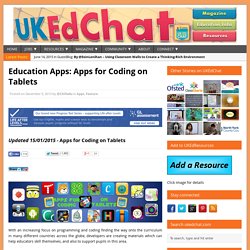
Coding and programming allows for individuals to show their creative side, but also embodies key, logical skills which need to be understood and mastered to create a successful programme. With technology advances racing ahead within societies, the need for programmers is going to be a key concept which individuals need to understand to be able to relate the apps, programmes and any further developments. The skills are not difficult to learn, but the issue in education is likely to be the confidence, understanding and skills of the teachers who will suddenly find coding or programming within their remit. Code Blast (iPad) £0.79 AndroidScript (Android) Free Kodu (Windows) Free A.L.E.X. Light-Bot App. Coding, Computer Science and iPads – My Current View.
Photo Credit: flickingerbrad via Compfight cc I have spoken a lot recently about my frustration with a lack of apps that help teach children to code.
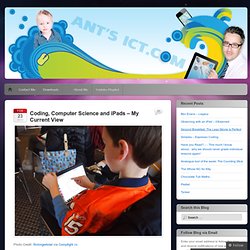
Largely this frustration is centred around the resulting perception of ICT and edtech this limitation gives our schools.